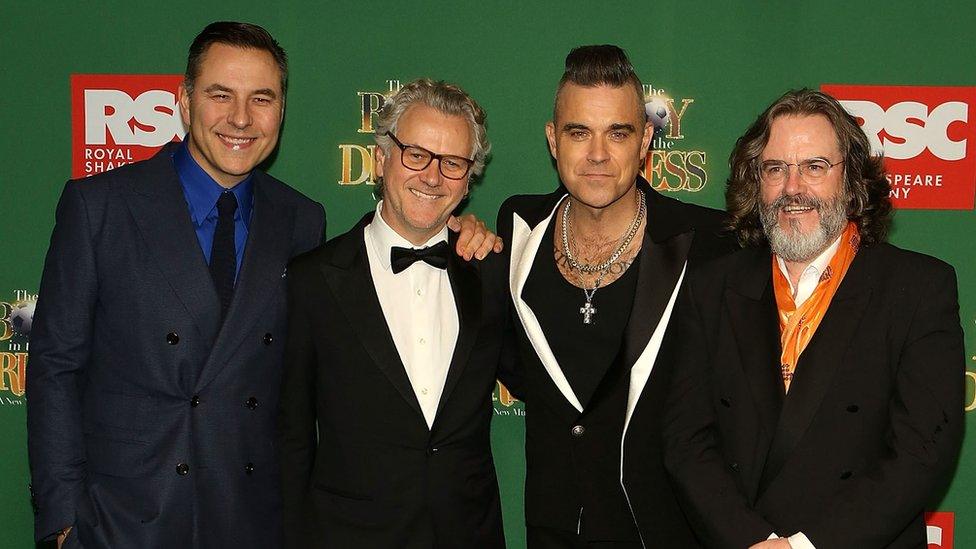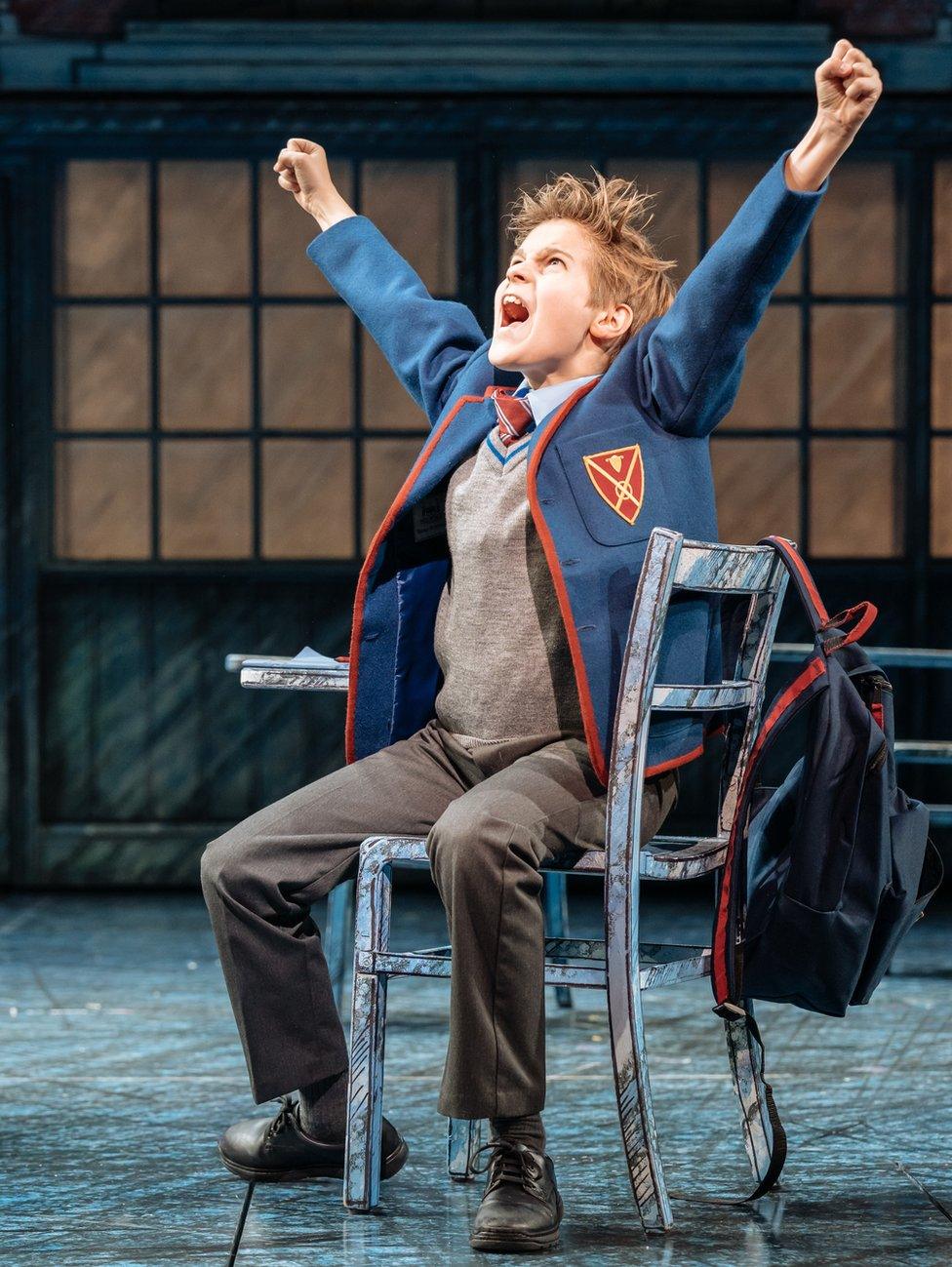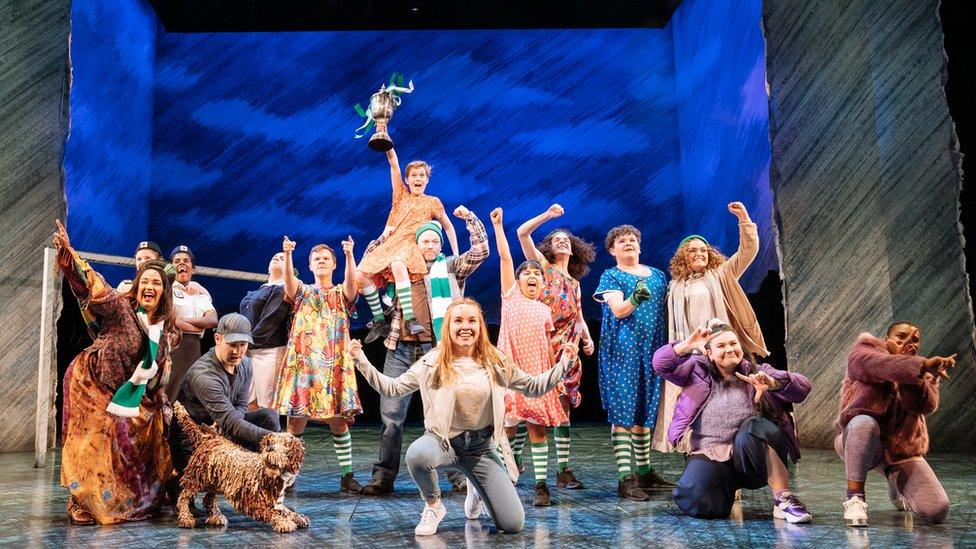The Boy in the Dress: Will Gompertz reviews the RSC's new musical ★★★★☆
- Published

There are certain tried-and-tested antidotes to the winter blues. Like looking up puppies on the internet. Or flicking through brochures of sun-drenched Caribbean holidays. And, when desperate, the fall-back option of browsing LinkedIn for profiles of old school friends with dreadful jobs.
These are all free options. If you're up for spending a bit of money (£16-£67.50) to lift your spirits, then you might consider buying a ticket to see the musical The Boy in the Dress at the Royal Shakespeare Theatre in Stratford-upon-Avon.
It is a show that embraces the concept of feel-good entertainment like a banker receiving a bonus, which is to say, shamelessly. Anyone after intellectual nourishment will leave feeling distinctly peckish, but those seeking a warm bath of comfort and joy will wallow in this page-to-stage musical reimagining of David Walliams' best-selling children's book The Boy in the Dress.

L-R: David Walliams with Guy Chambers, Robbie Williams and director Gregory Doran at the musical's press night
There is a decidedly showbizzy vibe to the production, from Aletta Collins' exuberant choreography to the deluxe stage design by Robert Jones. Hardly surprising, given the music and lyrics are by Robbie Williams and Guy Chambers, the songwriting duo behind late 90s pop hits Angels, Let Me Entertain You and Millennium.
Williams said he and Chambers were given just two weeks to write the 17 catchy numbers that are the show's heart and soul, compared to the three years they took to write his latest album. All I can say is the album must be an absolute banger, because the tunes they knocked out in a fortnight for The Boy in the Dress are terrific - particularly if you're a fan of their early work, the hooks from which appear throughout.
The story is a familiar tale of the misfit kid. Dennis is a 12 year-old football-loving schoolboy with inner feelings he doesn't understand. An existential angst not helped by his mother walking out on his father, and the locals bursting into a song about being Ordinary ("We said we're Labour, but we're voting Tory."), because, as they say, "What's the point of being different?"
Dennis goes to his bedroom to sing If I Don't Cry and asks his big brother John for a hug, which goes down like a crate of non-alcoholic beer on a stag night. John turns away in disgust and explains that mothers do hugs, brothers do wedgies.

Toby Mocrei as Dennis

And so, the light-hearted tone is set for two hours of gentle jokes and easy listening. John has a weakness for Magnum ice creams, Dennis likes magazines with pictures of ladies in dresses, while their dad (Rufus Hound) prefers magazines with pictures of ladies without dresses.
As Dennis moves ever more confidently towards his desire to try a frock on for size, his role as star striker for the school's football team is put in jeopardy by a heavy cold (this is about as dramatic as the story gets). But this is theatre, so the game must go on with some posh boys providing the oppo (cue, topical joke). The match is played out before our eyes in a superbly executed scene seamlessly mixing puppetry, choreography and the imaginative direction of Gregory Doran.

Two hours of gentle jokes and easy listening - with some puppets thrown in
An effective staging device of having the football fixed to the end of a pole manoeuvred by a cast member is used throughout. Except for one moment when a loose football is placed for a crucial penalty, which, for the next sequence to work, has to be scored. All the goalie need do is dive out of the way so the ball can roll in. What could possibly go wrong?
Well, on the night I went, the ball ricocheted off the keeper's legs and ended up in row G of the auditorium and not the back of the net. This led to an incongruous scene with the attacking team celebrating wildly having missed, while the ball is lobbed back into play from the stalls. Stick to the stick would be my note. It works.

Jackson Laing is one of four actors who play Dennis for different performances

As does this show, even though there are times where it is a little rushed, and others that are a tad too pantomime hammy. At least for me. I doubt any of the younger members of the audience would concur, and it is at them the production is aimed.
Those to whom I spoke afterwards loved every second: a chorus of approval that was palpable throughout, with rousing applause at the end of several of the big numbers including a glitter ball delight called Disco Symphony.
The Royal Shakespeare Company (RSC) pulled off a remarkable feat with Tim Minchin's musical reinvention of Roald Dahl's Matilda a decade ago. It has been a huge commercial success for the company, enabling it to invest in education and outreach projects. The RSC is hoping The Boy in the Dress will follow suit and transfer for a long and lucrative West End run.
Maybe it will, but the competition is a lot stiffer than when Matilda made the transition. The blockbuster juggernaut Hamilton wasn't about then, nor were Everybody's Talking About Jamie and Dear Evan Hansen - two musicals covering a similar ground of odd-one-out schoolboys.
Those three have a very contemporary flavour, while The Boy in the Dress already feels more dated (the book was published in 2008). The issues it tackles are timeless and universal, but the central dramatic device of a boy wearing a dress doesn't seem particularly shocking in 2019. And supposed flashes of epiphany such as the radical idea of starting a girls' football team either need to be cut altogether or rewritten to reflect that women's football is now a major sport.
But then we know The Boy in the Dress isn't frightened to be who he is and go toe-to-toe with the big guys. I hope it succeeds. There's plenty of room in this world for another joyful, uplifting musical - especially one that so unapologetically wears its heart on its sequined sleeve.
Recent reviews by Will Gompertz
Follow Will Gompertz on Twitter, external
